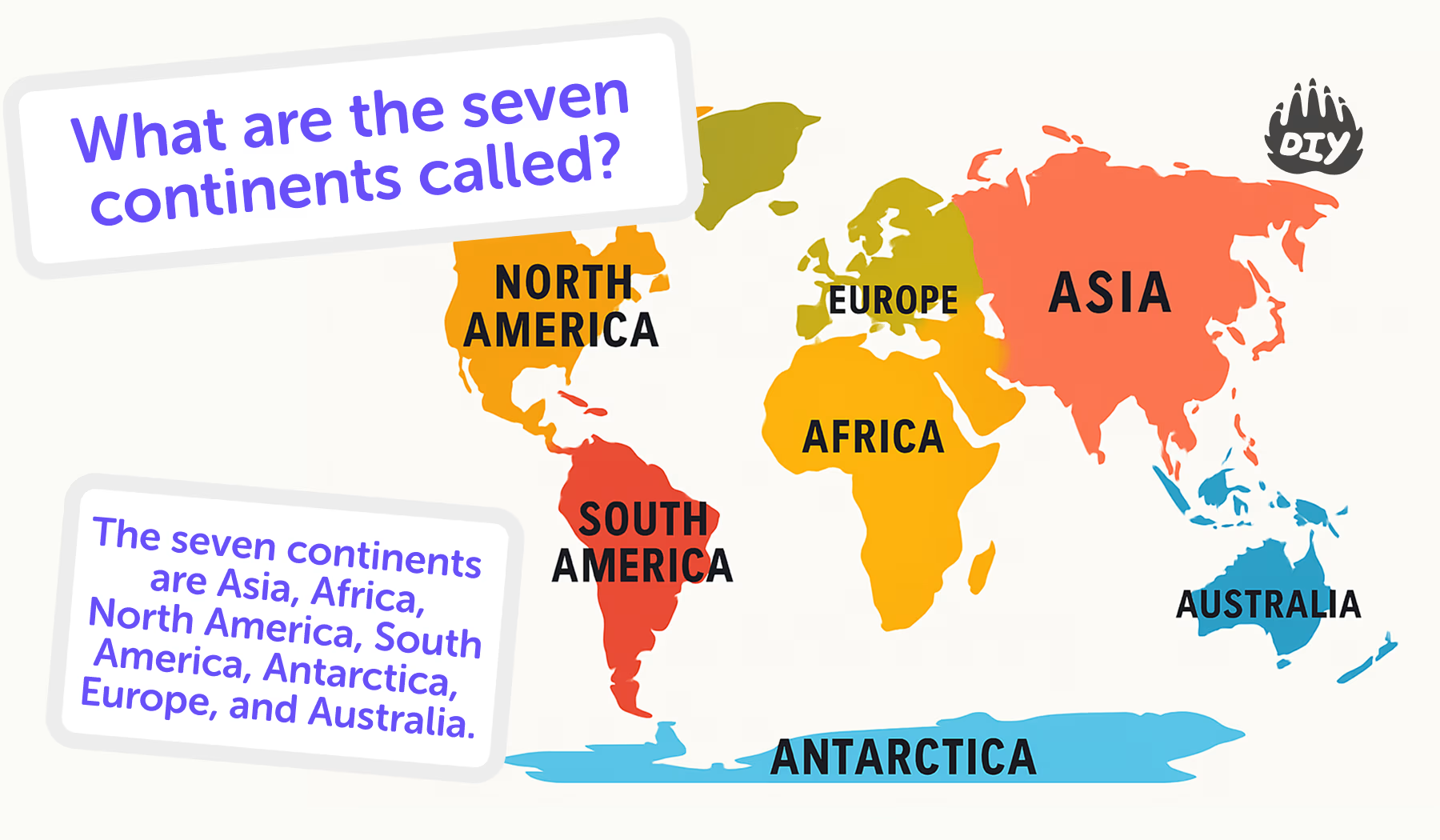Continents are the giant “puzzle pieces” of Earth’s surface. They help us organize the world into big regions that share land, cultures, and history.
Why Kids Learn About Continents
When kids learn geography, one of the first big questions is: What are the seven continents called? Knowing their names is the first step in understanding maps, countries, and global diversity.
If your child wants practice quizzes or explanations beyond the classroom, the AI Homework Helper is a safe way to learn more.
Seven Continents

Here are the seven continents and what makes each one special:
Asia
Largest continent in land and population.
Home to Mount Everest, the Great Wall of China, and the Taj Mahal.
About 4.7 billion people live here.
Africa
Second-largest continent.
Known for the Sahara Desert, Nile River, and amazing wildlife like lions and elephants.
Over 1.4 billion people live here.
North America
Includes the U.S., Canada, Mexico, and Central America.
Famous landmarks include the Grand Canyon, Niagara Falls, and Statue of Liberty.
About 600 million people live here.
South America
Known for the Amazon Rainforest and Andes Mountains.
Famous sites: Machu Picchu in Peru, Iguazu Falls in Brazil/Argentina.
About 430 million people live here.
Antarctica
Covered almost entirely in ice.
No permanent residents, only scientists and explorers.
Coldest place on Earth.
Europe
Known for castles, art, and history.
Landmarks include the Eiffel Tower, Colosseum, and Big Ben.
About 750 million people live here.
Australia (sometimes called Oceania)
Smallest continent.
Known for kangaroos, coral reefs, and the Sydney Opera House.
About 26 million people live here.
👉 Ask the DIY.org homework helper tool: “Can you quiz me on the seven continents?”
How to Remember the Seven Continents
Some memory tricks for kids:
Mnemonic: “All Amazing Animals Never Skip Any Exciting Adventure” (Asia, Africa, Antarctica, North America, South America, Europe, Australia).
Songs: Teachers often use songs to help kids remember.
Map practice: Coloring maps of continents reinforces their names.
How Continents Show Up in Everyday Life
Continents shape the foods we eat, the animals we know, and the sports we play.
Category | Example | Continent(s) |
Foods | Pizza | Europe |
Foods | Tacos | North America |
Foods | Rice dishes | Asia |
Animals | Giraffes | Africa |
Animals | Kangaroos | Australia |
Animals | Penguins | Antarctica |
Sports | Soccer/Football | Europe, South America |
Sports | Cricket | Asia |
Sports | Hockey | North America |
These quick examples help kids link classroom geography to real life.
Fun Facts About Continents
Asia and Europe are actually connected, some people call them “Eurasia.”
Antarctica is the only continent with no native people.
Africa has more countries (54) than any other continent.
Australia is both a continent and a country.
👉 Ask the AI Homework Helper: “Which continent has the most countries?”
Tips for Parents Helping With Geography Homework
Use puzzles and maps: Kids remember better when learning is hands-on.
Make connections: Link continents to foods, animals, or holidays.
Encourage quizzes: Let the AI Homework Helper test your child on names and facts.
Talk about travel: Even if you’ve never been abroad, discuss places your family would love to visit.
Kid questions about continents
What are the names of the seven continents?
Asia, Africa, North America, South America, Antarctica, Europe, and Australia.
Which is the largest continent?
Asia.
Which is the smallest continent?
Australia.
Which continent has no permanent residents?
Antarctica.
Do continents ever move?
Yes! They slowly shift due to plate tectonics.
How many countries are in the world?
About 195, spread across the seven continents.
The Bottom Line
The seven continents Asia, Africa, North America, South America, Antarctica, Europe, and Australia are the foundation of world geography.
For kids, learning their names is a first step in understanding maps, cultures, and the diversity of life on Earth. And with the DIY.org homework helper tool, they can keep practicing safely, with fun quizzes and clear explanations.



